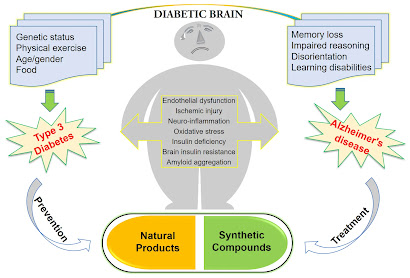Diabetes and Alzheimer's: What's the link?
Diabetes and Alzheimer's: What's the link?
Albeit the circumstances are apparently autonomous of one another, prior examinations have observed that individuals with type 2 diabetes are bound to foster Alzheimer's sickness.
In any case, the components behind this relationship have stayed stowed away.
A new report researched the effect of impeding insulin receptors and insulin-like development factor (IGF1) receptors in mouse models.
The work was completed at the Joslin Diabetes Center, partnered with Harvard Medical School in Boston, MA. The outcomes uncover that intruding on these comparative pathways disabled both learning and memory.
The analysts distributed their discoveries in the Proceedings of the National Academy of Sciences.
Insulin receptors and learning
The analysts worked with both the hippocampus and the focal amygdala, region of the mind that assistance with discernment capability, as well as metabolic control.
They investigated how mice with handicapped insulin and IGF1 receptors handled labyrinths, and the outcomes were uncovering.
In the first place, the scientists permitted the mice to investigate the labyrinth to really get to know its design, and afterward they impeded a pathway prior to once again introducing the mice to the maze.
These specific mice neglected to dissect the new blockade and on second thought attempted to go through the labyrinth as though it was the manner in which it had forever been.
Senior creator C. Ronald Kahn, boss scholastic official at Joslin and the Mary K. Iacocca Professor of Medicine at Harvard Medical School, takes note of that this is the principal concentrate on that shows a connection between these upset pathways and comprehension issues.
According to he, "Since these two receptors can to some degree make up for each other, what we did that was basic was this consolidated insulin and IGF receptor knockout."
Prof. Kahn proceeds to make sense of, "Be that as it may, it was additionally vital to do it in unambiguous districts, since on the off chance that it was wherever it could have debilitated mental health. By taking out both [receptors], we eliminated the essential way they function as well as the reinforcement framework that is as of now underlying."
Alzheimer's is certainly not an ordinary piece of maturing
Alzheimer's sickness is the most widely recognized reason for dementia, which is the point at which an individual is encountering cognitive decline and other discernment gives that are sufficiently extreme to obstruct day to day existence.
Alzheimer's, however, is certainly not an ordinary piece of maturing, and keeping in mind that a large portion of the people who have it are 65 years old and more seasoned, it can influence individuals who are more youthful.
Alzheimer's gets worse over the long run, and, by and large, it will in general deteriorate until the individual loses the capacity to carry on a discussion or answer what's going on around them.
There is no remedy for the condition, yet there are medicines accessible that can dial back movement and may further develop the singular's general personal satisfaction.
There are risk factors that researchers have related with fostering Alzheimer's illness. There are a few factors that individuals have zero control over, for instance, age, family ancestry, and hereditary qualities. Individuals could possibly impact other likely causes, be that as it may, including head wounds and coronary illness.
Different circumstances that can prompt vascular harm, for example, hypertension and stroke, may likewise be factors in Alzheimer's gamble.
Diabetes is likewise a gamble factor
Moreover, diabetes is a realized gamble factor for Alzheimer's illness. Different investigations have shown an association between insulin pathways and untimely mental degradation, dementia, sadness, and nervousness.
Additionally, studies have shown that strange receptors are available all the more frequently in the people who have both Alzheimer's and type 2 diabetes.
The ongoing review is quick to target explicit areas to assist with deciding circumstances and logical results.
Then, the specialists need to see what happens when they cross the mice they utilized in this review with mice that are hereditarily inclined to fostering Alzheimer's.
Exploring these associations, they say, may prompt proposals of way of life changes certainly before an infection cycle even starts.


.jpg)
.jpg)
Comments
Post a Comment